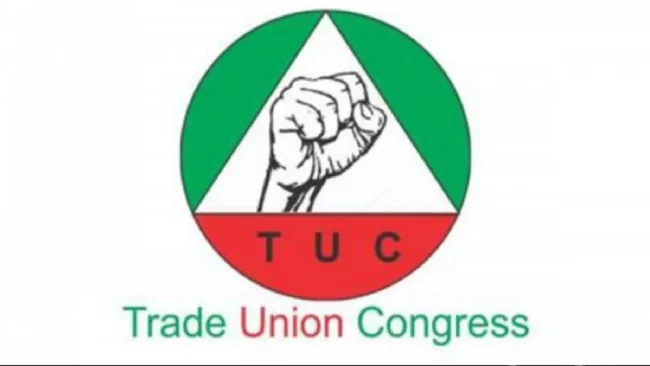The Trade Union Congress (TUC) has praised the Federal Government for making crucial adjustments to the Nigeria Tax Reform Bill, signalling progress in addressing the concerns of Nigerian workers and citizens.
In a press statement by its President, Comrade Festus Osifo, on Tuesday, made available to journalists in Abuja, the TUC expressed cautious optimism about the revisions, particularly the decision to maintain the Value Added Tax (VAT) rate at 7.5% and preserve the mandates of vital institutions like the Tertiary Education Trust Fund (TETFUND) and the National Agency for Science and Engineering Infrastructure (NASENI).
Osifo, in the statement, described these moves as significant steps towards protecting Nigerians from further economic hardship.
The Congress said that retaining the VAT rate at its current level was a crucial victory, shielding households and businesses from additional financial strain amid rising inflation and unemployment.
This decision, the TUC noted, aligns with the urgent need to foster economic growth rather than impede it.
Equally applauded was the decision to maintain TETFUND and NASENI, two institutions regarded as pillars of national development. TETFUND has been instrumental in advancing tertiary education, while NASENI has bolstered homegrown technological innovation.
The TUC emphasised that these institutions are vital for fostering self-reliance, enhancing productivity, and securing long-term national progress.
Despite these gains, the TUC expressed worry about unresolved aspects of the Tax Reform Bill that require immediate attention.
Chief among their concerns is the need to increase the annual tax exemption threshold from ₦800,000 to ₦2.5 million. Comrade Osifo stressed that this adjustment is necessary to alleviate economic pressure on struggling Nigerians, allowing for greater disposable income and a modest reprieve from the ongoing challenges posed by inflation and high living costs.
Another point of contention is the proposed transfer of oil and gas royalty collections from the Nigerian Upstream Petroleum Regulatory Commission (NUPRC) to the Nigeria Revenue Service (NRS).
TUC argued that this shift could have detrimental effects, citing the NRS’s lack of technical expertise to handle such specialised assessments. The Congress warned that this change might lead to significant revenue losses, heightened compliance costs, and diminished investor confidence in Nigeria’s oil and gas sector.
Amid these discussions, the inclusion of a derivation component in VAT distribution has been welcomed as a positive step towards stimulating economic activity at the sub-national level. The TUC commended this development as a transition from a rent-seeking model to one that encourages productivity and growth across all tiers of government.
As conversations around the Tax Reform Bill progress, the TUC called on the government to demonstrate a commitment to equity, economic stability, and improved living standards for all Nigerians. The Congress emphasised the importance of policies that reflect visionary leadership and a sincere dedication to the welfare of the people.
The Trade Union Congress reaffirmed its resolve to advocate for reforms that advance fairness, promote economic resilience, and secure prosperity for Nigeria’s workers and citizens alike.
READ MORE FROM: NIGERIAN TRIBUNE
